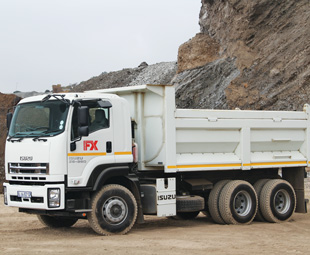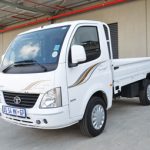An enterprising future

Isuzu Truck South Africa is changing the way it does business by creating an improved supply chain that enables clients to move forward and grow. GAVIN MYERS explains.
“Our industry must get smarter for our customers to move forward,” says Craig Uren, COO at Isuzu Truck SA. “The days of simply supplying hardware are gone, which is why we’ve changed our supply chain to allow us to get to market more quickly.”
Explaining the vision, Uren continues: “Our focus is no longer on what leaves the factory gate. Together with our dealers and suppliers, Isuzu Truck SA will have a more integrated relationship with current and future customers during the life of their trucks.”
Uren is referring to the first step in the new Isuzu Trucks “ENTERPRISE” business model, the 100-percent acquisition of Port Elizabeth-based KANU Commercial Body Construction and Automotive Chassis Technologies (KANU/ACT). Effective as of August, the new venture will allow Isuzu Trucks to have the capacity to initiate and build products according to customer specification.
“Everything can now be processed from one point of contact when buying trucks from us,” says Uren. It is expected that up to 30 percent of vehicles that leave Port Elizabeth assembly plant of Isuzu Trucks will have KANU-built bodies fitted.
Significantly, Uren explains, this means that the time taken to buy or replace a truck is drastically reduced. Customers will now be able to get on the road within weeks, instead of months …
“This is a logistical solution that will have benefits for us, the bodybuilders and the customers. For a small operator, the process of procuring a replacement truck, for example, can take up to three months after it has been bought, built, sent round the country to have a body fitted and then back to be delivered. That’s too long, and during this time they lose a lot of revenue.
“Likewise, we can provide a large operator a full turnkey supply with consistent build quality,” he says.
Bringing with him vast experience in all aspects of the assembly line, current plant manager, Sipho Sandla, will join the Isuzu Truck South Africa executive team and take on the role of GM of the KANU/ACT operation in Port Elizabeth. The current owner, Tony Wright, will stay on in an advisory capacity for a minimum of 12 months.
“Costs and other market negatives suggest we need to do things differently, be more proactive, box smartly and challenge the status quo. To do this we have to find opportunity in adversity,” Uren says, alluding to more to come for a really integrated relationship with customers during the life cycle of their trucks.
The adversity Uren talks about is the current state of South Africa’s economic environment, which is having a direct effect on the local truck market. “Nothing’s changed locally over the last two years; the variables just ebb and flow and shift the balance. Eskom is currently having a huge influence, causing havoc on productivity. As such, the truck market has come down quite quickly in the last three months, due to the various impacts on businesses,” he explains.
The impact of the power crisis on business behaviour has created a market fall-off of five percent in the year to date. The extra-heavy market is down by 7,5 percent, as is the medium segment, while the bus market has remained flat and the heavy commercial vehicle segment has shown growth of 5,5 percent year to date.
“This growth in the heavy segment is due to behavioural change in the industry – operators are either buying down when replacing large vehicles, or up if replacing smaller ones. They are adjusting their capacity options and trying to find the optimum levels. We saw this during the financial crisis of 2008/9.”
Uren thus expects the market to end on less than 30 000 units this year (as opposed to the company’s initial forecast of 32 000 at the beginning of the year). However, slight growth is expected in 2016, but that will be mainly due to replacement cycles and not overall growth of the economy.
“We understand that it’s tough to run a business in this environment, but it is a big opportunity for us to continue to provide to an industry that needs to keep going,” says Uren, who is pleased to report that Isuzu Truck SA has been able to benefit from a stable run between the yen and rand for the last 12 months.
“This has helped us manage our business and deal with the other variables,” he says. Isuzu Trucks currently has a market share of 13,6 percent (at the end of 2014 it was 12,9 percent), which equates to the company growing its volume just on 20 percent a year to date, compared to the same period last year.
“We’re happy where we are, given the market at the moment,” explains Uren. “Each year we strive to retail 4 000 units and we are trending for that in 2015.”
During the course of the third quarter, the Port Elizabeth plant of Isuzu Truck SA is expected to achieve a milestone on 30 000 units produced since the formation of the company in 2007.
There is no doubt that the production facility at Isuzu Trucks will continue to
move from strength to strength, especially given the company’s new “ENTERPRISE” business model and the advanced supply chain options it will bring to the brand’s operators.
Published by
Focus on Transport
focusmagsa




